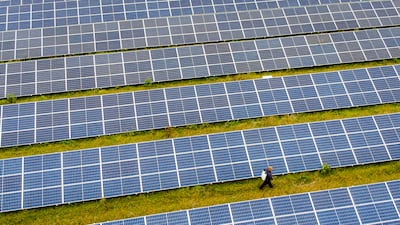About one in four jobs is expected to change in the next five years as generative artificial intelligence “comes of age” and the green economy takes root, creating and destroying millions of jobs in the process, the World Economic Forum has said.
In its survey of 803 companies globally, the forum found that employers expect a structural labour market churn of 23 per cent in the next five years.
The fastest-growing jobs are for those who specialise — whether in AI, machine learning, security or sustainability, according to the survey.
The sectors expected to experience the largest job growth include education, agriculture and digital commerce, the WEF found.
“In 2023, labour-market transformations driven by technological breakthroughs, such as the coming of age of generative artificial intelligence, are being compounded by economic and geopolitical disruptions and growing social and environmental pressures,” said Saadia Zahidi, WEF managing director.
Since the rapid proliferation of generative AI platform ChatGPT and smaller competitors, there has been much speculation over the burgeoning technology's influence on the jobs market.
A Goldman Sachs report in March found that up to 300 million jobs could be eliminated in the US and Europe as a result of generative AI.
Similar to WEF's findings, Goldman analysts said automation would also lead to new types of jobs and unleash more capital for reinvestment, ultimately increasing annual global gross domestic product by 7 per cent.
Already, automation is a primary factor in growing income inequality in the US, the world's biggest economy.
Fifty per cent to 70 per cent of changes to US wages since 1980 can be attributed to pay declines among blue-collar workers replaced or degraded by automation, according to the non-profit National Bureau of Economic Research and reported by Forbes.
Despite these headline figures, employers are becoming more tempered in their expectations for further automation.
The WEF's Future of Jobs Report 2023 suggests that tasks are seen as no more automated now than they were three years ago when the report was last published.
About a third of tasks (34 per cent) are currently automated, only 1 per cent above the 2020 figure.
Surveyed companies also downgraded their expectations for further automation to 42 per cent of tasks by 2027, compared to 2020 estimates of 47 per cent of tasks by 2025.
The green transition is expected to yield millions of new jobs for engineers to install and operate renewables projects, but an effort to reskill workers for these roles is falling behind, according to LinkedIn, which conducted additional research for the WEF report.
“The sustained growth of green jobs is really great news, particularly for job seekers who are facing upheaval in the labour market,” said Sue Duke, head of global public policy at LinkedIn.
“But LinkedIn’s data is clear that while there’s strong demand for talent with green skills, people are not developing green skills at anywhere near a fast enough rate to meet climate targets. There is an opportunity for everyone to help turn this around.”


